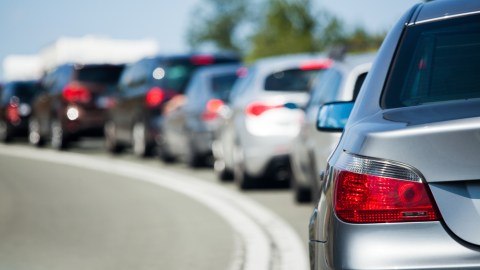Have We Reached ‘Peak Car’? What Driving Might Be Like in 2030

Have we already reached peak car? This is the term that urban planners are using to describe the decline in vehicle miles traveled per person.
According to the self-described “Rogue Planner” and “Nomadic Economist” David Levinson, as bad as traffic might seem on the way to grandma’s house this year for Thanksgiving, we will have far less traffic in the future.
What’s the Big Idea?
Levinson argues in an entertaining and informative blog post (with a dateline from the future – November, 2030) that the decline in miles traveled per person is not some short-term effect of the economic downturn nor is it the result of young people hating cars or the aging population driving less. This is all due to the steady forward march of technology, the effects of which will be even more pronounced in the future when more and more people work remotely and having Friday off will be the norm.
Writing from the future, here is how Levinson describes the evolution of the workweek:
Getting every-other Friday off (the 5/4 schedule) became standard by 2015, establishing the 3-day weekend every other week as the norm. By 2020, this was every weekend, as people moved to a 9 hour day, 4 days per week at the office, and the other 4 hours were “at home” work – checking email on the long weekend, erasing once strict separation of home and work. By 2025 taking every-other Monday off (the 4/3 schedule) was established in most large employers. Today we are seeing half-days on Wednesdays for many office workers, with only Tuesdays, Wednesday, and Thursdays as interactive collaboration days. The “flipped” office, where people were expected to do “work” at home on their own computers, and only show up for meetings is now standard.
This is obviously not a very rosy picture of the future for the automotive industry, which Levinson says will, by 2030, experience what has already happened to the newspaper industry, the post office, land lines, book stores and Blockbuster.
Moreover, if the future pans out the way Levinson predicts, the automotive industry certainly won’t be the only sector that will be faced with an adapt-or-die scenario. We will either be ordering products online or 3D-printing them ourselves at home. That simply means fewer trips to Main Street, USA. It also means a lot of empty office buildings, or what Levinson predicts will be the “Skyscraper Crash” in real estate.
If you’re wondering what this will mean for hipsters, Levinson provides a glimpse. They will flee the cities and move “to the now ironic suburbs among the working class immigrants.”
So what will Thanksgiving travel be like in 2030? You won’t be sitting in traffic. You’ll probably be a grandma, retired (as most people will leave the workforce by 60), sitting on your sofa watching your geeky grandkids 3D-print a turkey.
Over the river and through the woods we go!
Image courtesy of Shutterstock





